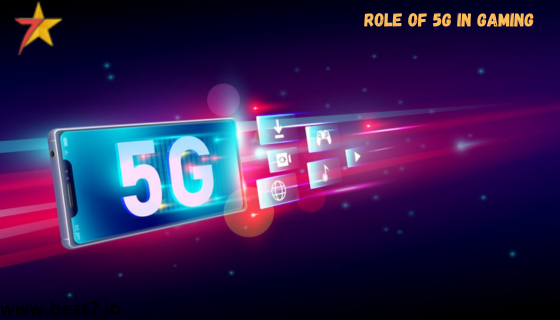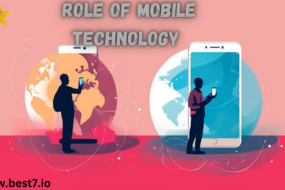
Mobile gaming will go through one of the most impactful changes in years with the introduction of 5G technology. This new form of internet will provide faster speeds and near-zero latency, meaning that the mobile gaming experience will improve and evolve faster than ever. The way that games are played, the internet capabilities, and even the technology used will undergo a reformation. The gaming industry has been slowly changing and growing in new ways with each technological advancement, but 5G will allow for types of mobile gaming previously deemed impossible.
Benefits of Faster Speeds and Reduced Latency Through 5G Technology
5G internet has the potential to change the mobile gaming experience entirely; the greatest benefit is the increased speed of the internet and the reduced latency. Previously, many mobile gamers were limited by the speed of their internet and their inability to engage in online multiplayer or other cloud-based gaming. However, with 5G, the internet speed on average will be 100 times faster than 4G, creating a seamless experience for mobile gamers. Some mobile games are already suffering in terms of success due to the limitations of the current internet speeds.
The Impact of Reduced Latency on Gaming Experience
Lowered latency is also an incredible benefit; with 4G networks, players are forced to deal with at least 50 milliseconds of latency between input and action. With 5G, the response time will be reduced to around 1 millisecond, making it nearly instantaneous. This reduced latency will provide smoother game graphics and engine operation, creating satisfying gaming experiences. This advantage will be particularly effective within competitive gaming and esports, where every player’s reaction time is crucial for their success.
The Future of 5G in Mobile Gaming
This revolution is incredibly close to becoming a reality for the majority of mobile gamers. By the year 2025, it is projected that 70% of all devices will have the capability to support 5G, meaning that the spread of this advancement across the globe is imminent. At this point, 5G will create a strong foundation for innovation for the mobile gaming industry, allowing games to take advantage of and utilize the accelerated speed that 5G offers.
Key Mobile Gaming Trends Enabled by 5G Technology
- Real-Time Multiplayer: Online multiplayer games will benefit significantly from lowered latency, as players will be able to react faster, resulting in smooth gameplay without lag.
- Cloud Gaming: Users will be able to play high-quality games on mobile without needing actual hardware capable of running them because 5G will support flawless data transmission between cloud servers and mobile devices.
- More Responsive Games: Increased response times are beneficial in many genres, but particularly in fast-paced formats like first-person shooters and racing games.
- Augmented Reality and Virtual Reality: Mobile-based AR and VR applications are underdeveloped because providing a low-latency experience is difficult. High responsiveness opens new ways for such technology to improve games.
- Mobile Esports: The increased speed of data transmission will launch a new era of mobile esports because it is now possible to maintain the necessary level of precision and speed of response.
- Graphics: Most of the games available on mobile have simple graphics. With 5G, this will no longer be necessary, as mobile games will be able to handle a significantly higher level of graphics quality and complex visuals as well.
- Improved User Satisfaction: In the end, everything improves due to the reduced latency. The user experience will receive a significant increase, with Qualcomm even projecting that user retention rates of mobile gaming apps will increase by 30% by 2026.
The Role of 5G in Supporting Mobile Cloud Gaming
Cloud gaming is meant to provide access to high-quality games to consumers without the need for actual hardware. Services such as Google Stadia and Microsoft’s xCloud have not experienced significant levels of success on mobile devices due to limitations inherent in the networking infrastructure. The key value of 5G with regards to gaming is the increased speed of transmission. When people think of the meaning of the next step in mobile networking, they often focus on the download speed of 10 gigabits per second. However, the more important improvement in terms of latency is the drastic reduction from about 20 milliseconds to around one. For cloud gaming, it means that mobile devices can now stream games at the best possible quality without lag and buffering.
5G’s Impact on Cloud Gaming Access and Growth
5G infrastructure will enable mobile gamers to engage with a variety of cloud-based games they otherwise would not be able to access. 60% of mobile gaming in 2027 will be cloud gaming on mobile, due to the convenience of and accessibility cloud gaming services offer. As such, one will no longer require high-end PC setups or costly consoles to experience games at an advanced level. Instead, mobile phone users will be able to play any title through cloud-based mobile gaming as it becomes more inclusive and accessible.
Benefits of Cloud Gaming on Mobile Through 5G
- On-demand gaming: No storage requirements when accessing a game from a cloud-based server at any time. As games are run on cloud servers, there will be no waiting for lengthy downloads, updates, or installations.
- Advanced game libraries: Cloud gaming on mobile will offer large varieties of games, including AAA titles. As such, players will no longer be limited in their preferred gaming experience.
- Cost efficiency: Players can engage with high-quality games without investing in a gaming PC, console, additional controllers, or games. A 5G-enabled cloud-based server will also minimize the required data processing on the device.
- Cross-platform gameplay: Players will be able to use 5G to compete on their mobile devices with their friends who play on other consoles or PCs through cloud gaming on mobile services.
- Real-time content updates: Games will be updated as soon as updates release on cloud servers. Thus, mobile users will not require any downloads or installations and can access the new content immediately.
- Battery efficiency: As games are run entirely on cloud servers, device batteries will not suffer rapid consumption. As such, more extensive use of games on the go will be enabled.
- Customizable settings: Certain graphics and settings may be changed on cloud-based platforms to improve gameplay according to the particular mobile device.
Enhanced Interactive Gameplay: Augmented Reality, Virtual Reality, and Beyond
5G technology will promote the transfer of augmented and virtual reality to mobile gaming, as these applications require enormous data processing capacities and low latency. With 5G, the line between virtual and physical objects will blur even more. By 2030, the augmented and virtual reality market on mobile is forecast to reach $50 billion, thus stimulating mobile game developers to create innovative gameplay formats that would allow the player to interact with the game in ways they have never done before.
New Trends in AR and VR-Based Mobile Gaming
- Virtual Training and Education: With the growth of mobile VR, the technology will be employed not only for entertainment purposes but also in education and training. Mobile augmented reality and virtual reality simulations will be increasingly designed for such professions as pilots, nurses, or architects. For example, regarding nursing, practicing in virtual realities could assist students in their preparation for interacting with patients or emergencies.
- Blending of AR and VR: In addition, with the advancements in MR, devices, and possibilities, game developers will start creating mixed-reality games, in which players wearing headsets will shift between AR and virtual worlds. Many games and their novelties will incorporate both AR and VR elements.
- Growth of Developer Innovation: Finally, all these factors combined with 5G will enable producers to develop more unusual gameplay mechanics based on AR or VR. Thus, the range of applications for mobile devices and types of mobile games will significantly expand.
The Growth of Esports and Competitive Mobile Gaming
The main trends in the future development of esports will be highly connected with the evolution of mobile gaming. As the industry by 2025, mobile gaming, in many ways enabled by 5G, will also grow. There is little doubt that an even greater expansion will be experienced by the competitive gaming and esports industry. With mobile phones becoming able to manage even much more complex, high-intensity games on a massive global scale, more and more players will become involved in competitive gaming.
Many expect that as much as 50% of all esports collections of tournaments will include mobile gaming by 2025. Thus, through 5G, esports will witness a new and previously unavailable audience, which will be reviving the industry. Mobile PUBG and Free Fire are already solid and well-known examples of mobile esports. During any given event, about half of the games will be held on mobiles. Participants, sponsors, and fans will all benefit in some manner from the expansion of esports to mobile gaming. The number of mobile-only competitions and leagues around the world and the willingness to sponsor them provides a promising future for a global, size-inclusive type of sports in which everyone can get involved.
Key Benefits of 5G for Esports and Competitive Mobile Gaming
- Increased accessibility: With the help of 5G, mobile esports will be more accessible for players in any corner of the world, which will help to democratize access and the opportunities for the development of competitive gaming.
- Better streaming quality: New opportunities for establishing solid connections and increased reference quality will make mobile gamers launch streams of their matches in HD, which will increase the possibility of them building an audience.
- Bigger prize pools: Mobile esports will grow along with the prize pools, which will become an additional aid for top players to become professionals in the realm of mobile games.
- Higher production value: As the industry grows, the introduction of 5G will enable mobile tournaments and league broadcasts to achieve a higher production value, with better resolutions and frames per second, all while offering a smoother experience.












